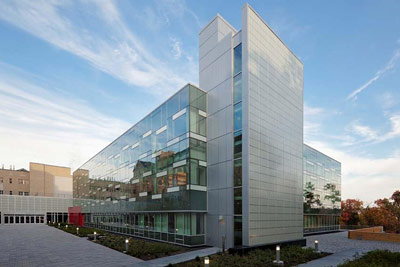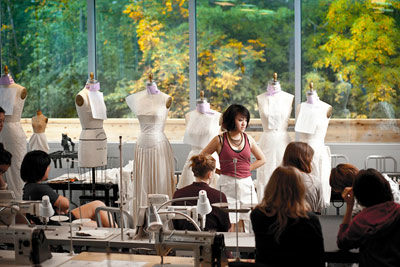Human Ecology Building earns LEED Platinum rating
By Ted Boscia


The U.S. Green Building Council has certified the Human Ecology Building as LEED (Leadership in Energy and Environmental Design) Platinum -- its highest rating for sustainable structures -- making it the first building to achieve the distinction on the Cornell campus.
Opened in August 2011, the 89,000-square-foot building earned 53 out of 69 possible LEED credits, earning high marks for being developed on a sustainable site, limiting energy use and emissions and ensuring indoor environmental quality.
"This is our first LEED Platinum certified building, but it will not be our last," said Kyu-Jung Whang, vice president for facilities services. "Cornell's commitment to sustainability extends to every level of leadership at the university. This platinum rating is the culmination of planning and effort by people all across campus who have been committed to this outcome for many years."
Most notable of the building's environmental features is an extensive real-time energy usage monitoring system, allowing occupants to reduce their environmental impact. Beginning in October, building performance data will be accessible through an online dashboard, giving researchers, students and others a trove of information to analyze its efficiency or to launch energy conservation competitions for users.
"Achieving LEED Platinum is especially satisfying given that sustainability is a key part of our research, teaching and outreach mission," said Alan Mathios, the Rebecca Q. and James C. Morgan Dean of the College of Human Ecology. "The building greatly advances our living-learning laboratory approach of encouraging students and faculty to actively study the same buildings where they gather for classes and research."
Located atop a three-story parking garage on Forest Home Drive, the Human Ecology Building contains labs for faculty in the Departments of Fiber Science and Apparel Design and of Design and Environmental Analysis. The building is also home to drawing and apparel design studios, an art gallery, textile testing labs, a wood and metal shop, the Cornell Costume and Textile Collection, and classrooms and meeting spaces.
Designed by Gruzen Samton Architects, the building faces Beebe Lake to the north and abuts Cornell Plantations to the east. The tucked-under parking garage greatly diminishes the building's environmental footprint, guarding against loss of vegetation, minimizing storm water runoff and preserving open natural areas. It earned additional points as a LEED sustainable site for its vast green roof with more than 25,000 native plantings and for sourcing one-quarter of building supplies within 500 miles of Ithaca and using recycled content for one-third of the building materials.
The building also scored well for innovative measures to protect indoor environmental quality. Human ecology student interns researched and recommended eco-friendly Greenguard certified furnishings with low emissions of volatile organic compounds.
The $71.7 million project, begun in summer 2001 after the closure of the Martha Van Rensselaer North building due to structural deficiencies, was funded by Cornell University and the State University of New York (SUNY) Construction Fund.
"This ambitious certification level required a great deal of collective vision and teamwork throughout the project both in setting the goal during the building design and following through during the construction process to ensure that the LEED standard was attained," said Robert Haelen, general manager of the SUNY Construction Fund.
Earlier this year, the College of Human Ecology met another sustainability milestone when its renovations to the east wing of Martha Van Rensselaer (MVR) Hall earned LEED Gold for commercial interiors certification -- also a first for the Cornell campus. The college is targeting LEED Gold certification for its floor-by-floor overhaul of MVR Hall, scheduled for completion in 2015.
Other campus buildings to be certified include Milstein Hall, Weill Hall, the Physical Sciences Building, the Cornell Combined Heat and Power Plant, the New York State Diagnostic Veterinary Laboratory, and Riley-Robb Hall's Biofuels Research Laboratory -- all of which are certified Gold -- and Alice Cook House, which is LEED Certified.
Ted Boscia is assistant director of communications for the College of Human Ecology.
Media Contact
Get Cornell news delivered right to your inbox.
Subscribe